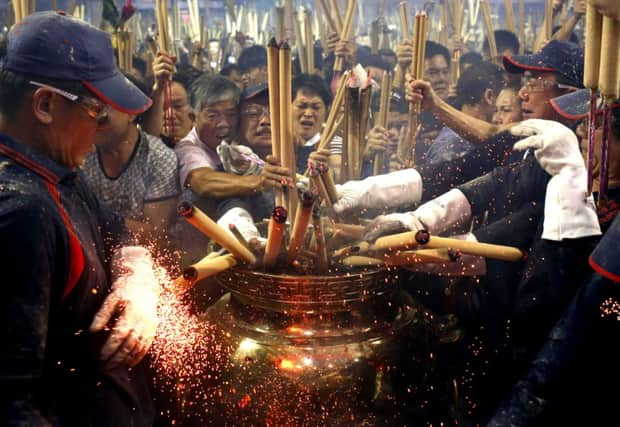Smog makes New Year a bit of a damp squib in China


Chinese New Year, which begins today, is normally marked by riotous displays of fireworks and countless firecrackers, which are thought to bring good luck and scare off evil spirits. The fireworks blacken the skies with smoke for hours.
However, with smog blanketing parts of northern, central and eastern China, including the capital, Beijing, and the commercial hub of Shanghai, some people decided a more subdued display was in order.
Advertisement
Hide AdAdvertisement
Hide AdWhile Beijing reverberated with fireworks and firecrackers, state media said sales had fallen and some residents said they would not be buying as many.
“This is not good for the environment, it’s not good for the air,” Lao Song said. “Last year, I spent about 300 yuan (£30) on fireworks, but I only bought about 100 yuan’s worth this year.”
Zhang Debi and his wife, Fang Lina, said their fireworks stall in Shanghai’s leafy former French Concession area had sold only half as many fireworks as last year.
“People are still going to light some fireworks because the holiday atmosphere just wouldn’t be right without them,” Ms Fang said. “But if too many are lit off, then that wouldn’t be good either.”
In keeping with president Xi Jinping’s call for frugality amid a campaign against pervasive corruption, sales of luxury items normally given as New Year gifts have fallen too.
“No-one dares to receive such precious gifts any more,” Dou Qinlian, a seller of caterpillar fungus, a rare and expensive herbal medicine, said at his store in the Tibetan capital of Lhasa.
The often gaudy New Year galas shown on state television channels have also been reduced in scale, or cancelled.
Maintaining a tradition of the country’s leaders visiting ordinary people at this time of year, Mr Xi flew to snowy and restive Inner Mongolia ahead of the week-long break, the most important holiday in the Chinese calendar.
Advertisement
Hide AdAdvertisement
Hide AdState television showed Mr Xi, who has tried to cultivate an easy-going, man-of-the-people image since becoming president last year, chatting with herders about sheep and taking tea in a traditional Mongol yurt, or felted tent.
Coal-rich Inner Mongolia was rocked by protests in 2011, as ethnic Mongols, angered at the destruction of traditional grazing land and perceived marginalisation of their culture, took to the streets.
“Build up Inner Mongolia as a bastion of security and stability,” state media quoted Mr Xi as saying.
Practitioners of the Chinese art of feng shui believe the year ahead may bring conflict and disasters related to fire but strong gains in stocks linked to wood.
The lunar new year is marked by the largest annual mass migration on earth, as hundreds of millions of workers pack trains, buses, aircraft and boats to spend the festival with their families.
For many Chinese people, it is their only holiday of the year.